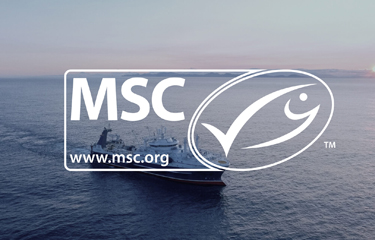The number of Marine Stewardship Council-certified fisheries continue to grow, increasing from 499 to 539 between April 2021 and March 2022.
The fisheries are collectively responsible for 15 percent of all wild marine catch, up from 14 percent in the previous year, MSC said in its 25th anniversary annual report.
The number of companies certified to supply and sell MSC-certified seafood has increased by 5 percent over the same period to 5,985 certificate-holders operating in more than 46,000 sites, the MSC said.
The total volume of seafood sold with the MSC’s blue label remained stable at 1.25 million mteric tons (MT) in the year ending 31 March, 2022, compared with the previous year.
MSC-labeled tuna sales spiked 24 percent in the past year, and sales of MSC-certified pet food grew by nearly 50 percent to 95,000 MT, MSC said. The lifting of COVID-19 restrictions globally resulted in a 39 percent increase in the volume of MSC-labeled sales in the food-to-go sector.
“There was also dynamic growth in North America, Southern Europe, Japan, and South Korea, with new MSC-labeled products and partnerships being launched,” MSC said.
As the MSC continues to grow, some nonprofits have continued to criticize its standards. Campaign group On the Hook has expressed concern the MSC’s eco-label uses a definition of sustainability that rests primarily on stock status, which does not incorporate the human or climate impacts of fisheries, the organization said in a press release.
In a recent survey of more than 2,000 Britons, On the Hook found 62 percent said they believe a seafood eco-label means there is limited or no damage to the environment associated with its catching process and that the product was not caught using a high-impact fishing practice, such as bottom-trawling. The survey also found 62 percent of respondents believed seafood products carrying an eco-label did not have an association with fishing methods that produced a significant volume of bycatch, such as sharks and turtles. On the Hook's survey also found that 48 percent of those surveyed said that an eco-label means the seafood does not come from a fishery where sharks are killed by finning. On the Hook has accused MSC of certifying fisheries where the practices identified in the survey take place.
"These results indicate that there is growing awareness of the human component of sustainability, with consequent expectations for products labelled as 'sustainable,'” On the Hook said.
For respondents that stated they purchased eco-labeled seafood products – either exclusively or sometimes – the survey revealed that expectations related to those eco-labels were significantly higher than is actually being delivered, On the Hook said. Of this subgroup, 80 percent said they believed an eco-label to mean there is limited or no damage to the environment associated with catching the seafood, and same number said that it meant seafood is not caught using a high-impact practice, such as bottom-trawling. Seventy-eight percent of consumers felt an ecolabel means seafood caught should not use methods that accidentally catch large numbers of non-target species, and 65 percent believe it means the seafood does not come from a fishery where sharks are killed by finning.
Among the entire group surveyed, 44 percent of those surveyed believed an eco-label means that there are limited carbon emissions associated with catching the labeled seafood product, and 41 percent believe an eco-label means that working conditions in the fishery are safe and hygienic. A further 36 percent of those surveyed believe the eco-label means basic human rights are upheld onboard the certified catching vessel, 36 percent believe that no forced or child labor is used in the fishery, and 30 percent believe that living wages are paid for all labor in a certified fishery.
“These public polling results further reinforce our view that there is a fundamental mismatch between what consumers expect from an eco-labeled product, and the reality of certified fisheries,” an On the Hook spokesperson told SeafoodSource. “Eco-label heavyweights such as the Marine Stewardship Council should take stock of these results and reevaluate whether they are delivering what seafood consumers need from them. With growing awareness of both the environmental damage and human rights abuses perpetrated by components of the fishing industry, consumers must be able to expect that a premium product carrying a sustainability guarantee means something."
Nearly half, or 47 percent, of those surveyed believe the responsibility for upholding the eco-label lies with the standard-setting organization granting the label, while 34 percent attributed responsibility to the retailer.
MSC released the latest version of its fisheries standard in June 2022, following a four-year review process. MSC Fisheries Standard Director Ernesto Jardim told SeafoodSource MSC aims to create a standard rigorous enough to push companies toward more sustainable practices, but one that is not so rigorous that it is out of reach for those interested in pursuing certification.
“The work we did for the last four years – mostly concentrated on the last few years –a lot of that work was trying to find that balance, trying to find that sweet spot,” Jardim said. “Sometimes it's not exactly a sweet spot, because you end up on a place that no one is because there are polarized views on some of the things we do – and you end up in the middle of these views – which is almost no man's land.”
Jardim acknowledged MSC has faced NGO criticism of its new standard, with some groups calling on the MSC to enact stricter requirements. Jardim said the criticism is in part a symptom of the MSC’s continued balancing of competing issues – a key element in ensuring companies actually strive to enact change.
“You can put the level of performance anywhere, from zero to wherever, and as soon as you put it too high, you lose the fishery,” Jardim said. “If we don’t have fisheries, we won’t make any changes, because if there’s no one there to actually enact the change we are asking, then there is no change.”
Image courtesy of the MSC







